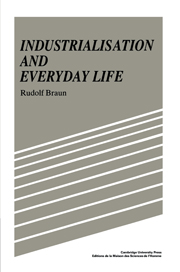Book contents
- Frontmatter
- Contents
- Prefaces
- Acknowledgements
- Note on measures and coinage
- Introduction
- 1 The preconditions for industrialisation
- 2 Changes to the structure of family and population in the industrial regions
- 3 Life and society of the population engaged in industry
- 4 The impact of industrialisation on the house and the rural economy
- 5 Work in the putting-out industry and its effect on the life of the common people
- 6 The outworkers' attitude to poverty and crises
- 7 Conclusion
- Postscript
- Appendix: a note on the administrative structure and social stratification in the countryside of Zurich during the Ancien Régime
- Notes
- Sources and bibliography
- Index
4 - The impact of industrialisation on the house and the rural economy
Published online by Cambridge University Press: 16 March 2010
- Frontmatter
- Contents
- Prefaces
- Acknowledgements
- Note on measures and coinage
- Introduction
- 1 The preconditions for industrialisation
- 2 Changes to the structure of family and population in the industrial regions
- 3 Life and society of the population engaged in industry
- 4 The impact of industrialisation on the house and the rural economy
- 5 Work in the putting-out industry and its effect on the life of the common people
- 6 The outworkers' attitude to poverty and crises
- 7 Conclusion
- Postscript
- Appendix: a note on the administrative structure and social stratification in the countryside of Zurich during the Ancien Régime
- Notes
- Sources and bibliography
- Index
Summary
The changes to settlement and housing and to the rural economy under the influence of domestic work in the putting-out industry have endowed the picture of the Oberland cultural territory with its characteristic traits, which it has retained until today. The problems we want to deal with separately in this chapter have already been outlined above many times and in very different connections. It can only be a matter of a piecemeal presentation of the complex material, most of which has still to be researched locally. We must limit ourselves to recording a few dominant traits, which necessarily involves a degree of stylisation, beginning with a few remarks of a fundamental and general nature, to remind ourselves about matters discussed earlier on.
Let us begin by remembering that industrialisation and the possibilities for existing created by it should not be held solely responsible for the type of changes and the way they occurred. They simply present one component, the other being assembled from those forces which we identified in Chapter 1 as factors impeding industrialisation. They are the traditional forms of land right and land use, which were preserved by the restrictions of a rigid economic order and were upheld by the traditionalistic spirit of an ancient peasant economic mentality.
In a purely agricultural enterprise the house (and the outbuildings) and the land belonging to it (including the actual use of the land) are mutually dependent. The number of people who live and work on the farm is also included in this dependency relationship.
- Type
- Chapter
- Information
- Industrialisation and Everyday Life , pp. 111 - 130Publisher: Cambridge University PressPrint publication year: 1990



